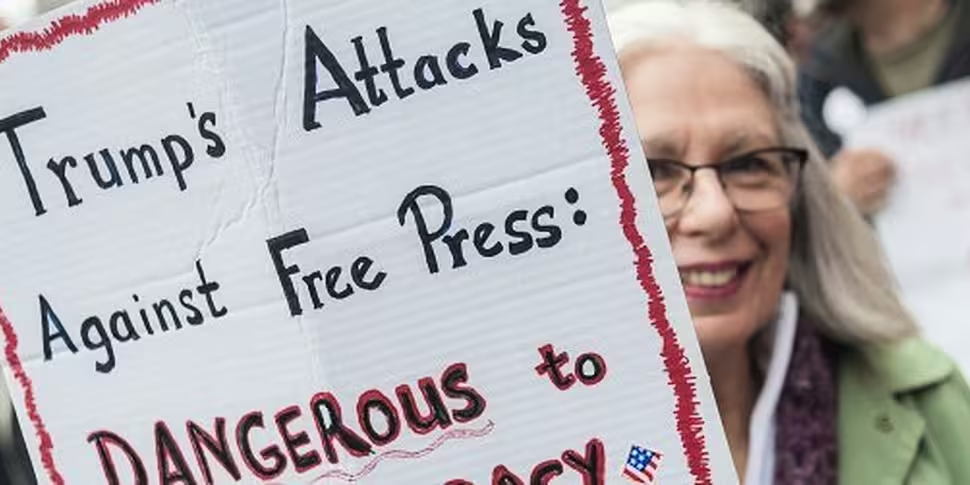Norway has topped the list of press freedom for a second year in a row.
Reporters Without Boarders (RSF) has published its annual report, which sees Ireland unchanged at number 14 in the rankings.
This puts us far above countries like Germany, France, the UK, US, Italy and Greece.
But the index says Ireland's highly concentrated media ownership is a problem.
And it says interviewing garda sources has been "virtually impossible" since the Garda Siochana Act of 2005, which bans police officers from talking to journalists without prior authorisation.
“Officers contravening the ban risk dismissal, a fine, or up to seven years in prison”, it adds.
In general, RSF say media freedom "has never been so threatened" and its global indicator has never been so high.
This measure of the overall level of media freedom constraints and violations worldwide has risen 14% in five years.
In the past year, nearly two thirds (62.2%) of the countries measured have registered a deterioration, while the number of countries where the media freedom situation was "good" or "fairly good" fell by 2.3%.
But it says the European Union and Balkans region continues to be the one where the media are freest.
Turkey's President Recep Tayyip Erdogan addresses supporters in Presidential Palace, Ankara | Image: Depo Photos/ABACAPRESS.COM
Poland, Hungary and Turkey
The index says media freedom has “retreated wherever the authoritarian strongman model has triumphed.”
Poland fell seven places in the 2017 Index.
"After turning public radio and TV stations into propaganda tools, the Polish government set about trying to financially throttle independent newspapers that were opposed to its reforms", it says.
Hungary has fallen four places, Tanzania is down 12 and Turkey is down four at 155th place.
It says Turkey "swung over into the authoritarian regime camp" after the failed coup against Recep Tayyip Erdogan last year.
It says the country "now distinguishes itself as the world’s biggest prison for media professionals."
British Prime Minister Theresa May leaves 10 Downing Street in London | Image: Victoria Jones/PA Wire/PA Images
UK
On Britain – which falls 40th on the list - the organisation says: “A heavy-handed approach towards the press - often in the name of national security - has resulted in the UK slipping down the World Press Freedom Index.
“Parliament adopted the most extreme surveillance legislation in UK history, the Investigatory Powers Act, with insufficient protection mechanisms for whistleblowers, journalists, and their sources, posing a serious threat to investigative journalism.”
“Even more alarming, the Law Commission's proposal for a new 'Espionage Act' would make it easy to classify journalists as 'spies' and jail them for up to 14 years for simply obtaining leaked information.”
File photo of US President Donald Trump | Image: Niall Carson/PA Wire/PA Images
US
Reporters Without Boarders say Donald Trump’s rise to power in the United States and the Brexit campaign in the United Kingdom were marked by “high-profile media bashing” - a highly toxic anti-media discourse that drove the world into a new era of post-truth, disinformation, and fake news.
The RSF criticised US President Donald Trump for declaring the press an “enemy of the American people” in a series of verbal attacks toward journalists.
They say he also attempted to block White House access to multiple media outlets in retaliation for critical reporting.
“Journalists continue to be arrested for covering various protests around the country, with several currently facing criminal charges.
“The Obama administration waged a war on whistleblowers who leaked information about its activities, leading to the prosecution of more leakers than any previous administration combined.”
“To this day, American journalists are still not protected by a federal ‘shield law’ guaranteeing their right to protect their sources and other confidential work-related information.”
“And over the past few years, there has been an increase in prolonged searches of journalists and their devices at the US border, with some foreign journalists being prevented from any travel to the US after they covered sensitive topics such as Colombia's FARC or Kurdistan.”
The US is 43rd on the global index.
This image made from video of a still image broadcast in a news bulletin by North Korea's KRT shows leader Kim Jong Un at what was said to be a "Combined Fire Demonstration". Independent journalists were not given access to cover the event depicted in this photo | Image: AP/Press Association Images
North Korea
North Korea is ranked last on the press freedom list - at 180th - with the RSF saying: “North Korea’s totalitarian regime continues to keep its citizens in a state of ignorance and fear of being sent to a concentration camp for listening to radio broadcasts from outside the country.”
It says the Korean Central News Agency (KCNA) is the sole source of official news for the print and broadcast media.
But it adds that authorities are displaying greater flexibility towards the international media, allowing more foreign reporters to cover official events.
In September 2016, Agence France-Presse even opened a bureau in partnership with KCNA, as the Associated Press did in 2012.
CNN also has a presence in Pyongyang, with correspondent Will Ripley currently based there.
But RSF says the regime "continues to exercise meticulous control over the information available to the foreign media, as seen when British journalist Rupert Wingfield-Hayes was expelled in May 2016".













